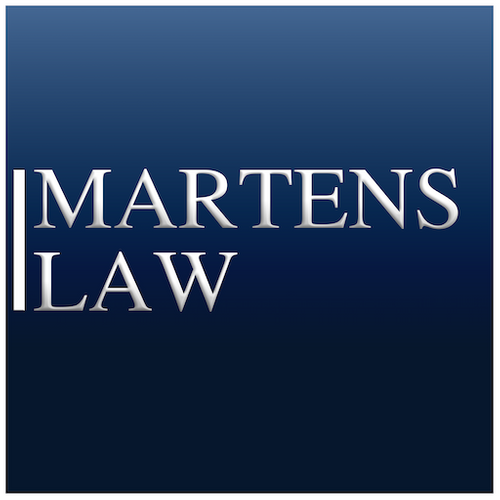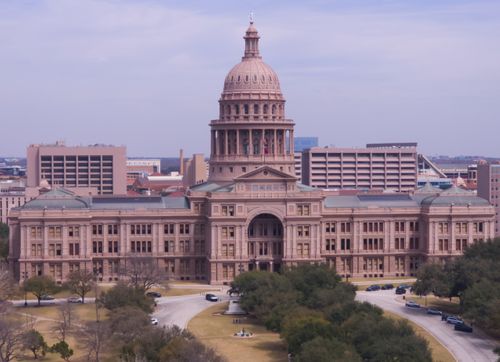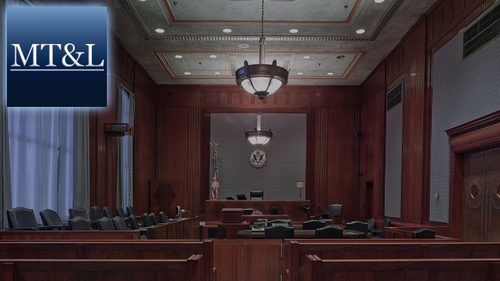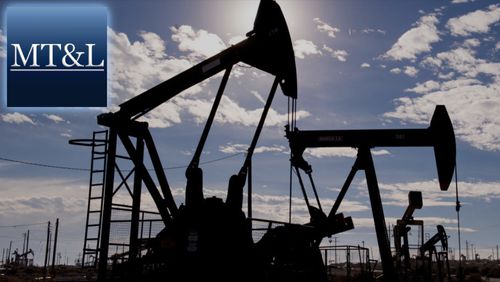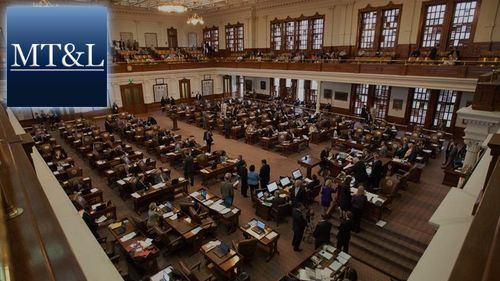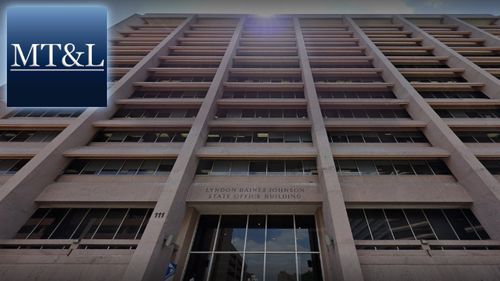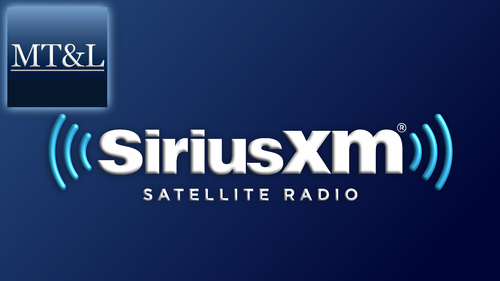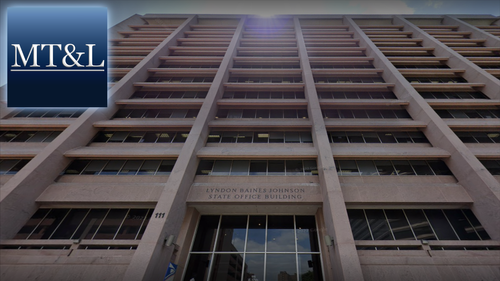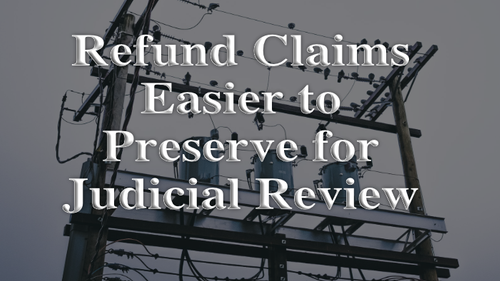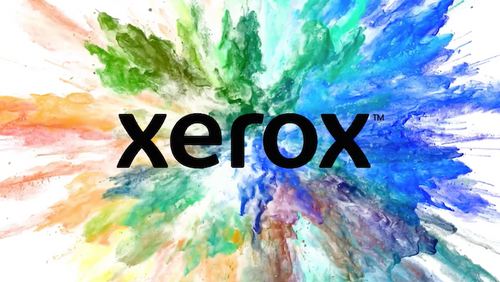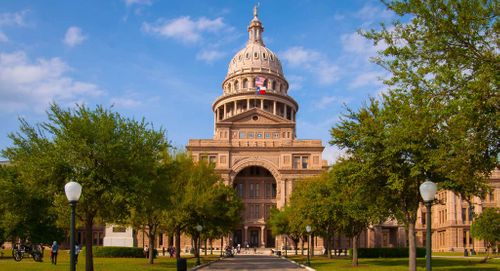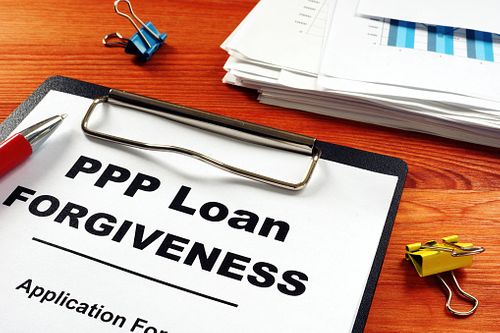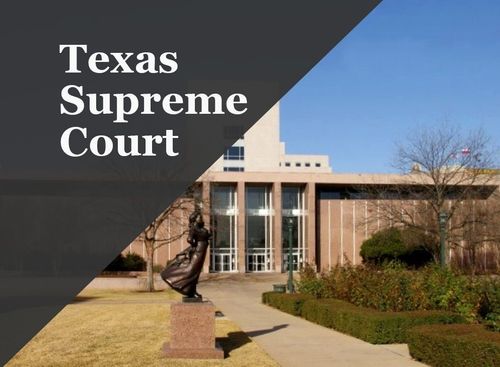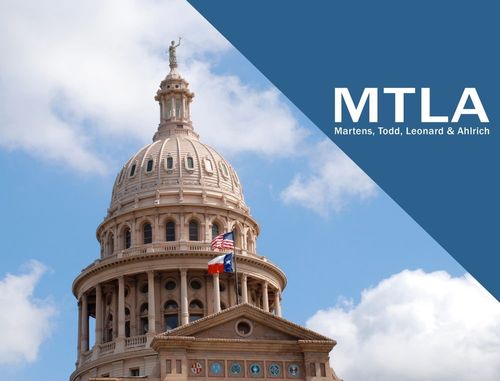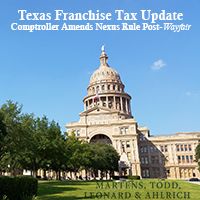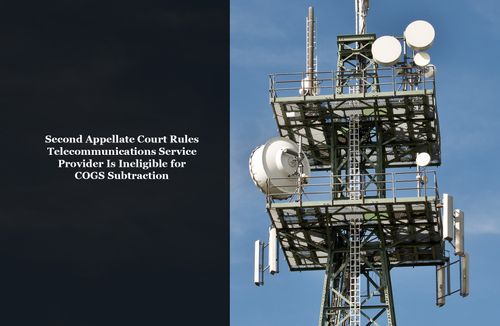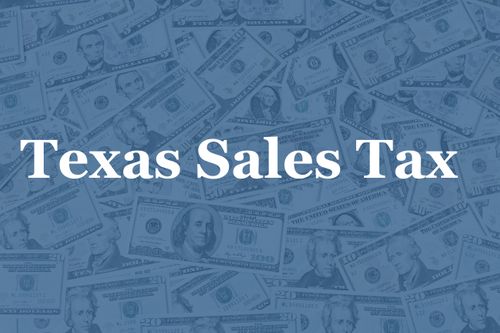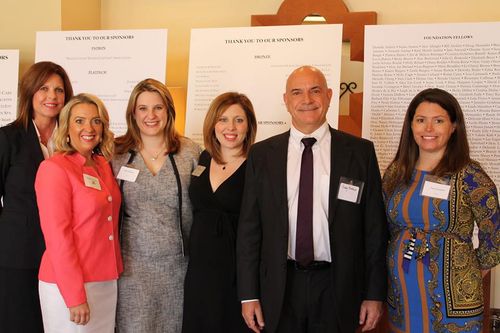Blog
Texas Tax Update: New Texas “DOGE” Law Shifts Power Balance in Texas Lawsuits What Taxpayers and Businesses Need to Know About Senate Bill 14
Gordon Martens & Jimmy Martens
Texas just took a major step in reshaping how state agencies—like the Texas Comptroller of Public Accounts—adopt rules and how courts review and apply those rules. Senate Bill 14, now law as the Regulatory Reform and Efficiency Act, significantly rewires the administrative process, and most importantly for Texas taxpayers, eliminates Texas courts’ deference to agency interpretations of the law.
moreTexas Tax Update: Bill Proposal Regarding Local Sales Tax Sourcing
Gordon Martens and Valentyna Kravchuk
This article provides an update on House Bill 134 regarding local sales tax sourcing in Texas.
After a multi-year court-battle to shift certain local tax sourcing from origin sourcing to destination, the Legislature is now considering a bill that would achieve the Comptroller’s proposed destination sourcing by amending the Texas local tax sourcing laws.
moreMartens Law Welcomes New Audit Defense Professional: Gilbert Zamora
We are pleased to announce that our law firm has recently expanded its expertise with the addition of Gilbert Zamora, a highly experienced Audit Defense Professional and retired CPA.
Our new team member, Gilbert Zamora, has specialized experience in navigating complex audit disputes and assisting clients in the recovery of overpaid taxes and minimizing state tax audit exposure and audit liabilities. Gilbert’s experience includes:
- · Texas tax audit defense professional (12 years)
- · Texas tax audit defense professional with Martens Law (2004-2012) (8 years)
- · Texas sales tax policy specialist with Texas Comptroller (12 years)
- · Texas sales tax hearings policy specialist with Texas Comptroller (2 years)
- · Texas franchise tax policy analyst with Texas Comptroller (5 years)
- · Texas state tax auditor Texas Comptroller’s Audit Division (11 years)
Gilbert will make significant contributions to our clients’ continued success and growth. His arrival represents not only a reinforcement of our audit defense capabilities, but also an opportunity to deliver even greater value to our clients.
moreTexas Tax Update: Upcoming 2024 Trials
Gordon Martens & Valentyna Kravchuk
This article provides a short overview of the various Texas tax trials set for 2024.
moreTexas Sales Tax Update: Texas Comptroller Changes Local Tax Responsibilities for Online Sales
Gordon Martens & Valentyna Kravchuk
The Comptroller has once again amended his local tax sourcing rule as part of his years-long effort to shift local tax sourcing for online sales to the customer’s location. The amendment, however, is not limited to online sales so it could affect taxpayers in a wide variety of circumstances.
moreComptroller Reverses Policy to Recognize Nontaxable Treatment of Flowback Services and Water Transfer Services
Gordon Martens and Valentyna Kravchuk
On December 13, 2023, the Comptroller issued an interoffice memorandum reversing prior policy and providing the circumstances under which flowback services and water transfer services are not subject to Texas sales. Prior policy treated these services as the taxable rental of the flowback and water transfer equipment. The principal requirement for flowback and water transfer services to receive nontaxable treatment is for the service provider to have on-site personnel who continuously regulate and control the operation of the equipment as needed.
Why the change?
In 2020, the Comptroller issued a memo providing guidance to its Audit Division on the taxability of flowback services. The memo stated that charges for flowback were taxable as the rental of equipment and that sales or use tax was due on the total charge for the rental of the equipment. After an industry round table in August of 2023, the Comptroller decided that flowback and water transfer services are non-taxable, provided that they fit within the description of flowback services in the memo.
What are flowback and water transfer services?
Flowback and water transfer services are provided at oil and gas well sites to support hydraulic fracturing operations. Flowback operations involve the temporary use of oilfield equipment to handle the fluid that flows back from fracking operations. After the injection process in the fracking operation is completed, the internal pressure of the rock formation causes fluid to return to the surface. This flowback fluid contains the frack fluid plus other naturally occurring materials. Well operators hire flowback service providers to handle this fluid.
moreMartens, Todd & Leonard is pleased to announce the addition of a trial and appellate attorney: Valentyna Kravchuk
Martens, Todd & Leonard is pleased to announce the addition of trial and appellate attorney Valentyna Kravchuk to its Texas state and local tax controversy team. Ms. Kravchuk joins the other members of the firm in representing taxpayers in Texas tax controversies before the Texas State Office of Administrative Hearings, the Texas state courts, the Texas courts of appeals, and the Texas Supreme Court.
Valentyna Kravchuk graduated from the University of Texas School of Law in 2023. Ms. Kravchuk has experience working for the Texas Comptroller of Public Accounts, where she interned for the Office of Special Counsel for Tax Hearings and the Tax Policy Division. During law school, Ms. Kravchuk interned for the United States Bankruptcy Court, Western District of Texas, and served as team leader for Tax Moot Court. She also served as Vice President of her undergraduate Mock Trial team.
Ms. Kravchuk may be contacted at vkravchuk@textaxlaw.com..
About Martens, Todd & Leonard
Martens, Todd & Leonard is a trial and appellate law firm headquartered in Austin, Texas. It handles only Texas tax cases, specifically those involving the Texas sales tax and Texas franchise tax. The firm’s attorneys have handled cases all the way through the Texas Supreme Court and U.S. Supreme Court. They speak and write frequently on a variety of Texas sales tax and franchise tax topics and have published articles in publications such as the Journal of State Taxation, the Texas Bar Journal, the Texas Lawyer, and the Texas Tech Administrative Law Journal. For more information, please visit texastaxlaw.com.
moreTexas Tax Legislative Update: New Bills Filed in the Upcoming Texas Legislature
By Gordon Martens and Reid Diaz
Pre-filing for the upcoming 88th legislative session began yesterday, November 14, 2022. The following proposals filed on the first day seek to make significant changes to Texas sales tax and franchise tax policy.
Sales Tax & Franchise Tax Bills
H.B. No. 391 proposes to repeal the franchise tax entirely after report year 2022. It would not affect the status of an entity that has had its corporate privileges, certificate of authority, certificate of organization, certificate of limited partnership, corporate charter, or registration revoked, suit filed against it, or a receiver appointed prior to the repeal, although taxable entities could still challenge those actions.
H.J.R. No. 36 proposes a constitutional amendment to eliminate school district maintenance and operations property taxes. The prohibition is conditioned on a yearly determination by the Comptroller that the prohibition will not decrease school funding for school districts for the tax year or subsequent tax year.
H.B. No. 268 proposes an overhaul of the tax system that would eliminate virtually all existing taxes and enact a value-added tax at a combined state and local maximum rate of 8.72%. The tax base would be the amount by the value of property and services supplied by a taxpayer to its customers exceed the value of property and services supplied to the taxpayer by its vendors
moreTexas Sales Tax Update: Texas Comptroller Proposes Amendments to Local Tax Sourcing (Again)
Gordon Martens
On September 23, 2022, the Texas Comptroller proposed amendments to Rule 3.334, which deals with local sales and use taxes. This is the latest development in a years-long effort by the Comptroller to change local tax sourcing for many online and shopping app sales.
In 2020, the Comptroller adopted amendments to Rule 3.334’s subsection (b)(5) which shifted the local tax sourcing for many internet and shopping app sales to the customer’s location instead of the seller’s location (i.e., “origin” sourcing). Texas law provides that a sale occurs where it is “consummated” and provides that sales are typically consummated at the seller’s place of business. See, e.g., Tex. Tax Code § 321.203(b) (“If a retailer has only one place of business in this state, all of the retailer's retail sales of taxable items are consummated at that place of business . . .”).
As a result of this origin sourcing, cities in Texas have been successful in attracting out-of-state businesses to build large facilities by offering incentives in the form of a partial share of the local tax collected. Comptroller Hegar says that those deals, and—origin-based local tax sourcing underpinning them—are unfair to the myriad counties, cities and other local tax jurisdictions that aren’t party to them and who don’t share in the tax proceeds, even if the goods are delivered to residents there. In 2020, Comptroller Hegar decided to amend his local sales tax rule to provide that orders placed through websites and shopping apps aren’t received at a “place of business.” That meant that more of those sales would be sourced to the customer’s location (i.e., “destination” sourcing).
moreTexas Franchise Tax Update: Texas Supreme Court Finds in Taxpayer’s Favor in Sirius Apportionment Case
Gordon Martens
In Hegar v. Sirius XM Radio, Inc., the Texas Supreme Court reversed the Third Court of Appeals, rejecting the Comptroller’s argument that receipts from services should be apportioned based on the “receipt-producing, end-product act” test. Instead, the court found that Sirius’ services should be apportioned based upon the locations of the employees and equipment providing the service.
Sirius XM Radio performs its satellite radio subscription services through an extensive network of equipment located around the globe. While roughly 8–9% of Sirius’ customers are in Texas, virtually none of its equipment, employees, or operations are located in Texas. Sirius broadcasts over 150 satellite channels, produced primarily from studios in New York City and Washington, D.C. Only one Sirius radio channel has ever been produced in Texas. Sirius transmits signals to satellites using uplink facilities in New Jersey, Washington D.C., and Georgia. These satellites are launched from Kazakhstan and orbit 22,000 miles above the earth. They transmit signals back to Earth, where they are received either (1) directly by radios in customer vehicles or (2) indirectly after being received by a terrestrial repeater. Further, Sirius controls these satellites through facilities in Panama, Ecuador, and Georgia. Finally, the radios receiving the signals are owned by the customers, not Sirius.
moreTexas Franchise Tax Update: Comptroller Issues FAQs on Cost of Goods Sold
Jimmy Martens & John Grubb
On February 4, 2022, the Texas Comptroller recently provided guidance clarifying several Texas franchise tax Cost of Goods Sold (“COGS”) issues for Texas taxpayers. The Comptroller issued the guidance as responses to Frequently Asked Questions (“FAQs”). The FAQs touch on several important topics, including the proper calculation of COGS and whether labor and other expenses across certain industries qualify for subtraction, which components of mixed transactions qualify for a COGS subtraction, how to determine Internal Revenue Code (“IRC”) Section 179 expense limitations and federal bonus depreciation for Texas COGS purposes, and information on capitalizing versus expensing costs.
Texas COGS is calculated separately from federal reporting and industry calculations.
Subtractable costs must be expressly listed in Texas Tax Code § 171.1012. Several industry-specific COGS subtractions covered by the FAQS include:
Is the Expense Included in COGS Calculation?
Contractor’s payments to subcontractors
Yes, if the expenses relate to real property construction, improvement, remodeling, repair or industrial maintenance.
moreRefund Claims Easier to Preserve for Judicial Review—For Now
Lacy Leonard & John Grubb
A Texas appellate court sitting en banc recently made it easier for taxpayers to preserve refund claims for judicial review by quoting the relevant subsection(s) of the manufacturing exemption statute and including supporting documentation identifying the equipment and transactions at issue.
El Paso Electric Company (“El Paso”) seeks refund of sales tax paid in error on exempt manufacturing equipment.
El Paso is a fully integrated public utility in the business of manufacturing, generating, transmitting, and distributing electricity in west Texas and southern New Mexico. Hegar v. El Paso Electric Company, No. 03-18-00790-CV (Tex. App.—Austin Aug. 13, 2020, no pet. h.) (majority opinion). El Paso filed an administrative sales tax refund claim for different types of equipment under a variety of sales tax exemptions. Of the $5.1 million total refund El Paso sought, the Comptroller agreed to refund over $2.5 million.
The Comptroller would not agree to refund sales tax El Paso allegedly paid in error on the purchase of meters and disconnect collars that El Paso believed were exempt because they were “telemetry units related to step-down transformers,” a specific type of exempt manufacturing equipment. Tex. Tax Code § 151.318(a)(4). After the Comptroller denied El Paso’s administrative refund claim, El Paso filed a district court lawsuit. The Comptroller moved to dismiss the district court suit, arguing that the statement of grounds filed in El Paso’s earlier administrative refund claim failed to adequately put the Comptroller “on notice” of El Paso’s claim for telemetry units related to step-down transformers.
moreManufacturing Exemption - Raw Materials as Real Property
Jimmy Martens & John Grubb
A Texas appellate court recently allowed the manufacturing exemption for equipment used to process real property into products.
Lignite begins as real property and ends as tangible personal property.
Texas Westmoreland Coal Company (“Westmoreland”) owned and operated a lignite coal mine in Texas. Lignite, also called brown coal, is the lowest grade of coal, but like other forms of coal, is found in large veins underground. Hegar v. Texas Westmoreland Coal Co., No. 03-20-00406-CV (Tex. App.—Austin Oct. 7, 2021, no pet. h.).
To extract the coal, Westmoreland first removes the top layer of soil using a dragline (which was not at issue in the case) to expose the lignite formation. Then it uses a variety of excavators with large, toothed buckets to crack, break, or rip apart the lignite into smaller pieces to meet its customer’s size requirements. Once the buckets are full, the excavators drop the lignite into dump trucks from approximately 12 feet high, further breaking the lignite apart. At the end of the process, the lignite ranges from the size of a pea to no larger than a soccer ball.
Westmoreland claimed the manufacturing exemption on its purchase of the excavators.
moreTexas Franchise Tax Update: Finance Leases Qualify for Lower Franchise Tax Rate
Jimmy Martens and John Grubb
Businesses that finance sales using leases should consider filing Texas franchise tax refund claims based upon a recent Texas court case.
A Texas appellate court recently held that Xerox Corporation (“Xerox”) was entitled to compute its franchise tax based upon the lower Texas franchise tax rate, which resulted in a refund of half of the Texas franchise tax Xerox had paid during the relevant periods.
Xerox leases printers long-term to businesses under financing lease agreements. Xerox’s finance lessees:
- Receive possession, but not title, to the equipment;
- Were responsible for insuring the equipment against loss;
- Were required to make all payments under the lease, even if the contract was terminated; and
- Could purchase the equipment at the end of the lease but typically did not because the lease was designed to last for the useful life of the equipment.
Wholesale sales qualify for lower Texas franchise tax rate, but rentals do not.
Generally, taxpayers pay Texas franchise tax at the rate of 0.75%. Tex. Tax Code § 171.002(a). Retailers and wholesalers (collectively hereinafter “Retailers) pay Texas franchise tax at half that rate, or 0.375%. Tex. Tax Code § 171.002(b).
moreLocal Sales Tax Sourcing Rules for Online Retailers Delayed Again
Lacy Leonard and Gordon Martens
Texas Taxpayers have reached a deal with the Comptroller to delay implementation of the Comptroller’s new local sales tax sourcing rules for internet and shopping app sales until a trial expected to occur the week of June 13, 2022.
On Monday, August 30, 2021, Travis County District Judge Karin Crump presided over hearings over whether to issue an injunction blocking an effort by Comptroller Glenn Hegar to unilaterally upend the local sales tax sourcing rules established under Texas law. The next morning, as the hearing reconvened, the parties announced an agreement to delay implementation of these new rules and the Comptroller acquiesced in the injunction.
The Comptroller’s rule amendments would switch online sales to being sourced to the customer’s location, instead of the business location of the seller. This would apply to many sellers who have only one place of business in Texas. Sourcing online sales to these sellers’ business locations enhanced local taxing authorities’ ability to incentivize taxpayers to locate large facilities within their boundaries, since they could offer the taxpayers a cut of the local sales tax revenue. Generally, local governments (and the citizens they represent) want businesses to relocate within their boundaries. In doing so, the relocated businesses create jobs and boost the local economy. They also generate sales and property taxes for the local governments’ operations to help fund things like public schools and fire departments.
moreNew Laws Ease Taxpayers’ Path to State Court
Katy Ballard and Gordon Martens
On June 7, 2021, the Texas Governor signed both HB 2080 and SB 903 into law. The bills substantially lower the practical hurdles that taxpayers must meet to challenge the Comptroller in state court.
New Option to Challenge Audit Assessments
Generally, to bring a protest suit in state court, a taxpayer must pay the audit assessment under protest and submit a written protest letter raising the arguments that it will raise in its protest suit. Under the current “pay-to-play” provision of the Texas Tax Code, a taxpayer must pay the entire amount of the audit assessment to challenge it in court.
A newly-enacted law, HB 2080, eases that burden by allowing the taxpayer to pay only the undisputed portion of its audit assessment. Importantly, however, any portion of a disputed amount that is not initially paid but is ultimately determined to be due will accrue penalties and interest. Moreover, the new procedure requires that the taxpayer complete an administrative redetermination proceeding prior to initiating the suit. The new law effectively lowers the price of admission into state court but adds to the administrative remedies the taxpayer must first exhaust. Taxpayers retain the option to pay the entire assessment under protest, bypass the administrative proceeding, and go directly to court.
moreTexas Franchise Tax Update: Texas Taxpayers Spared from Tax Increase Arising from PPP Loan Forgiveness
Gordon Martens and Katy Ballard
Texas taxpayers can breathe a collective sigh of relief since House Bill 1195 was signed into law on May 8, 2021. The bill provides that forgiveness on Paycheck Protection Program (PPP) loans will not be considered revenue for Texas franchise tax purposes. Additionally, HB 1195 clarifies that taxpayers may include qualifying expenses paid with PPP loans into their Texas franchise tax compensation or cost of goods sold calculations (if they otherwise qualify).
Prior to the passage of this bill, the Comptroller’s position was that taxpayers must include the proceeds from the forgiven PPP loans in total revenue on their franchise tax reports for the year in which the loan was forgiven. For a significant number of taxpayers, this would have resulted in the taxpayers being hit with an increased tax bill stemming from PPP loan forgiveness.
The 2020 CARES Act stipulated that PPP loan forgiveness would not be classified as taxable income for federal tax purposes even though loan forgiveness is usually taxed under federal income tax law as cancellation-of-debt (COD) income. This was the U.S. Legislature’s nod to the hardship the pandemic posed to taxpayers and the economy. The IRS, however, attempted to tax the PPP loan forgiveness in another manner, announcing that it would deny deductions, otherwise deductible, for expenses giving rise to the forgiven loan. These expenses include, for example, payroll costs and rent. The U.S. Congress quickly passed federal legislation after the IRS announcement to bar it from denying deductions financed with forgiven PPP loan proceeds.
moreTexas Franchise Tax Update: Congressman Fires Back with Proposed Bill After Texas Comptroller Threatens to Tax PPP Loan Forgiveness
Gordon Martens
A Texas lawmaker has introduced a bill in the current legislative session reversing the Comptroller’s policy of treating federal Paycheck Protection Program (PPP) loan forgiveness as revenue for Texas franchise tax. The proposed bill also allows taxpayers to include the corresponding costs when calculating their compensation or cost of goods sold subtraction.
During the 2021 Texas Comptroller’s Tax Policy Update, an official at the Comptroller’s office stated that the Comptroller plans to require taxpayers to add any forgiven portion of a PPP loan they received to their total revenue, which is the starting point for the Texas franchise tax margin calculation. Although cancellation-of-debt (COD) income is typically taxed under federal income tax law, the U.S. Congress provided, in the 2020 CARES Act, that PPP loan forgiveness would not be classified as taxable income. After the IRS responded by indicating it would deny deductions for the expenses that gave rise to the forgiven loan (e.g., payroll costs), the U.S. Congress stepped in and passed federal legislation in late 2020 barring the IRS from denying deductions financed with forgiven PPP loan proceeds.
moreTexas Supreme Court Rejects Pay-to-Play Requirement
Jimmy Martens, Allison Cunningham and Gordon Martens
In May of 2020, the Texas Supreme Court held in EBS Solutions, Inc. v. Hegar that a taxpayer may gain access to the Texas courts without first paying the tax assessment against it in full, if the taxpayer satisfies the appropriate jurisdictional requirements.[1] EBS Solutions was audited for Texas franchise tax and received an assessment of tax, penalties, and interest for four year of almost $300,000.[2] EBS disagreed with the Comptroller’s assessment and sought to challenge it. However, EBS was unable to pay the full assessment.
Generally, a taxpayer must pay the entire amount of tax, penalties, and interest assessed “under protest” to gain access to the courts.[3] This means taxpayers with large assessments and limited funds are effectively forced to challenge their assessments in the administrative forum where the Comptroller alone decides whether his assessment is correct. Thus, taxpayers who are unable to prepay their assessments to gain access to state courts are deprived of a neutral forum.[4]
moreTexas Franchise Tax Update: Texas Comptroller Adopts Comprehensive Changes to Apportionment Rule
John LaBorde, Andersen & Gordon Martens, Martens, Todd & Leonard
Texas Franchise Tax Update: Texas Comptroller Adopts Comprehensive Changes to Apportionment Rule
The Texas Comptroller has adopted broad amendments to his Rule 3.591 governing franchise tax apportionment. In doing so, the agency rewrote numerous detailed rules for sourcing dozens of different types of receipts. Notably, for receipts from services that don’t fall under one of the specific rules, the Comptroller’s rule codifies the “end-product act” test which first appeared in a 1980 Comptroller Hearing (Decision No. 10,028) and was recently employed by the Third Court of Appeals in Hegar v. Sirius XM Radio, Inc., No 03-18-00573-CV (Tex. App.—Austin 2020, pet. filed). The Comptroller intends to apply the adopted rule retroactively except for a few provisions which he concedes are changes in policy.
The adopted rule also:
· Codifies recent policy excluding net losses from sales of investments and capital assets (prospectively)
· Distinguishes between financial derivatives sold for hedging and securities treated as inventory, but sources both categories to the location of the payor
moreTexas Sales Tax Update: Texas Comptroller Changes Local Tax Rule to Undermine Economic Development Agreements
Jimmy Martens and Gordon Martens
Local governments, like cities and counties, collect local taxes to finance their governmental operations. Generally, local governments receive local sales taxes based upon orders that local businesses receive within their boundaries. Local governments may also receive local use taxes when goods are delivered to customers within their boundaries. A seller collects local use taxes only when the local sales tax where the item is sold is less than the maximum rate (2%) and the local use tax is not of the same type (such as a city tax or a county tax) as the local sales tax that applied. This may occur, for example, when a seller receives an order outside city limits and sells the product for delivery to a customer residing within city limits.
Generally, local governments want businesses to relocate within their boundaries. In doing so, the relocated businesses provide jobs, goods, services and generate sales and property taxes for the local government’s operations.
To induce a business to relocate to a particular city, the city may offer the business incentives, often in the form of shared local sales tax revenues. These offers are authorized under Chapter 380 of the Texas Local Government Code and are commonly known as “Chapter 380” agreements.
moreTexas Franchise Tax Update: Texas Supreme Court Denies COGS Subtraction for Equipment Rental Company’s Delivery and Pickup Costs and Film Theater’s Exhibition Costs
Jimmy Martens and Gordon Martens
Introduction
In Sunstate Equipment Co. v. Hegar, the Court denied the cost of goods sold (COGS) subtraction for the heavy equipment rental company’s costs to deliver and pick-up equipment. In Hegar v. American Multi-Cinema, Inc., the Court denied the COGS subtraction for AMC’s film exhibition costs. While AMC ultimately lost, as we explain below, the Court’s rejection of an argument that the Legislature can “clarify” prior law and thereby give it retroactive effect may undermine the Comptroller’s position in other cases.
Sunstate Equipment Co. v. Hegar
On April 3, 2020, the Texas Supreme Court published its opinion in Sunstate Equipment Co., LLC v. Hegar1 denying Sunstate a COGS subtraction for the costs Sunstate incurred to deliver and later pick-up the heavy construction equipment that Sunstate had rented to its customers for use at construction sites.
Background. Sunstate rents out heavy construction and industrial equipment to its customers. This includes equipment such as forklifts and earth-moving machinery. Most of Sunstate’s customers were subcontractors doing construction work and Sunstate typically delivered the rented equipment to its customer’s construction site. Sunstate owned and maintained a fleet of delivery vehicles capable of transporting the equipment to a construction jobsite and it hired employees to deliver, set-up and pick-up the equipment once the rental period was over. Sunstate incurred costs in connection with the acquisition and use of the equipment, as well as costs to deliver the equipment to constructions sites and to pick it up when its rental customers finish using it:
moreTexas Tax Update: COVID-19 Relief
Jimmy Martens and Gordon Martens
Introduction
This paper discusses the relief provided by Texas in response to the COVID-19 crisis, including taxpayers’ responsibilities for Texas sales tax and Texas franchise tax reporting. The Comptroller has provided a blanket, automatic extension for Report Year 2020 Texas franchise tax reporting and payments to July 15, 2020. The Comptroller has not extended the sales tax reporting deadlines but has offered potential relief to taxpayers depending on their circumstances. Many local appraisal districts have extended rendition deadlines and the Comptroller has offered motor vehicle registration and titling extensions. The Comptroller has temporarily shuttered his field offices and has offered some relief to taxpayers in administrative redetermination proceedings. The Comptroller expects tax revenue to fall significantly but has not yet released an estimate of the impact of COVID-19 on tax collections.
Franchise Tax Relief
Texas Franchise Tax Automatic Extension for All Taxpayers. On April 2, 2020, the Comptroller announced that the due date for Report Year 2020 Texas franchise tax reports is automatically extended for all taxpayers to July 15, 2020.1 The automatic extension includes both the report deadline and the payment deadline. The Comptroller extended the franchise tax deadline “to be consistent with the Internal Revenue Service” which has extended certain federal income tax filing deadlines to July 15, 2020.2 The Comptroller’s press release explained the rationale for extending the franchise tax deadline:
moreTexas Franchise Tax Update: Texas Supreme Court Allows Revenue Exclusion and Remands Cost of Goods Sold Subtraction for Oil Rig Repair Company
Jimmy Martens and Gordon Martens
On April 3, 2020, the Texas Supreme Court issued its opinion in Hegar v. Gulf Copper & Manufacturing Corporation in which it found the oil rig repair company could reduce its revenue by the payments it made to hourly subcontractors but limited its COGS subtraction to the costs incurred as a producer of goods.1 The Supreme Court determined that Gulf Copper did not qualify as a “deemed” owner of goods and remanded the case to the trial court to determine how much Gulf Copper could subtract as an “actual” owner of goods.
Gulf Copper inspects, repairs, and upgrades offshore drilling rigs for rig owners and drilling contractors who use the rigs to drill offshore oil and gas wells. Each rig must be custom-modified or rebuilt so that it can be used to drill well(s) efficiently, safely, and legally in particular areas. Gulf Copper manufactures component parts which it installs on the rigs. To perform its work, Gulf Copper hires subcontractors to supplement its employee workforce.
The Comptroller audited Gulf Copper’s Report Year 2009 Texas franchise tax report and alleged that Gulf Copper had improperly excluded $80 million in payments to subcontractors from total revenue. The Comptroller also alleged that Gulf Copper improperly claimed a cost-of-goods-sold subtraction for various costs not specifically listed in Tex. Tax Code § 171.1012. The Comptroller allowed Gulf Copper to subtract the initial costs of fabricating the rig’s component parts, but denied Gulf Copper the COGS subtraction for the costs incurred in completing the component part and installing it on the rig.
moreTexas Franchise Tax Update: Comptroller Amends Nexus Rule Post-Wayfair
Jimmy Martens and Gordon Martens
On September 27, 2019, the Texas Comptroller proposed amendments to his Texas franchise tax nexus rules that would make out-of-state entities with no physical presence in Texas subject to Texas franchise tax. The preamble to the proposed amendments explains that the amendments are “in response to the United States Supreme Court decision in South Dakota v. Wayfair, Inc.” 138 S. Ct. 2080 (2018); 44 Tex. Reg. 5605 (2019) (to be codified as an amendment to 34 Tex. Admin. Code § 3.586). The Comptroller’s proposed amendments may violate the U.S. Supreme Court’s precedents setting limits on states’ taxing powers.
For decades, states were prohibited from imposing sales taxes on out-of-state entities that lacked a physical presence inside the state. Quill Corp. v. North Dakota, 504 U.S. 298 (1992). This physical presence requirement gave out-of-state e-retailers a competitive advantage—the ability to makes sales without charging tax—over their in-state counterparts. Then, in 2018, the U.S. Supreme Court struck down the “physical presence” requirement. Wayfair slip op. at 2. The Supreme Court noted that each year, the physical presence rule “becomes further removed from economic reality” and called it an “incorrect interpretation” of the Constitution even at the time it was formulated. Id. at 2. The Court decided that a company can be subject to this tax collection requirement as long as it has a sufficient “economic presence.” Id.
moreTexas Franchise Tax Day in the Texas Supreme Court October 9th beginning at 9:00 a.m.
Jimmy Martens
The Texas Supreme Court has scheduled three important Texas franchise tax cases for oral argument on the morning of October 9th. The arguments will be available by livestream.
All three cases concern critical aspects of the Cost of Goods Sold subtraction. The last case set for argument on October 9th, Gulf Copper & Manufacturing, also addresses important aspects of the Revenue Exclusion for businesses in the oilfield services and construction industries.
Here’s the schedule:
9:00 am Sunstate Equipment Co. – Is a heavy equipment rental company allowed to subtract its costs to delivery and later pick up the equipment from the construction site? Val Perkins will argue for the taxpayer
9:50 am American Multi-Cinema, Inc. – Is a movie theatre allowed to subtract its movie exhibition (auditorium) costs when computing the margin tax base? Doug Siegel will argue for the taxpayer..
moreMetropolitan Telecommunications v. Hegar: Second Appellate Court Rules Telecommunications Service Provider Is Ineligible for COGS Subtraction
Danielle Ahlrich and Allison Cunningham
On August 21, 2019, the Texarkana Court of Appeals ruled that a telecommunication service provider, Metropolitan Telecommunications (“MetTel”), is not entitled to calculate its franchise tax margin using the cost of goods sold (“COGS”) subtraction. See Metropolitan Telecomms. Holding Co. v. Hegar. This holding is consistent with the Austin Court of Appeals’ opinion in NTS Communications, Inc. v. Hegar.
The Comptroller audited MetTel and disallowed the company’s COGS subtraction, claiming that MetTel was not eligible for the subtraction because it did not sell tangible personal property—i.e., goods. Rather, the Comptroller contended, MetTel was a service provider not entitled to COGS.
In its suit challenging the Comptroller’s assessment, MetTel argued that it did, in fact, sell tangible personal property because the digital light, electrical, and radio frequency signals that it produces for its customers are perceptible to the senses and, therefore, within the statutory definition of tangible personal property. MetTel also tried to distinguish itself from service providers on two grounds. First, MetTel argued that it did not provide a service because its signals were created through an automated process, and not through employee labor. Second, MetTel argued that it was not a service provider because it did not own—but rather leased—the infrastructure used to make its signals available to customers.
moreTexas Franchise Tax: BREAKING NEWS: Texas Supreme Court Will Decide Three Important Texas Franchise Tax Cases
Jimmy Martens and Allison Cunningham
On June 28, 2019, the Texas Supreme Court accepted and scheduled for oral argument three important Texas franchise tax cases involving excluded revenue and the COGS calculation.
The Gulf Copper case concerns whether a company that builds and repairs offshore drilling rigs may exclude from its revenue payments made to the company’s hourly contractors that work on the rigs. It also concerns whether the company may include the costs of manufacturing incurred throughout its installation processes.
The AMC Theaters case asks whether showing movies to the public for a fee constitutes the sale of tangible personal property and, thus, whether a movie theater can include costs to exhibit movies in its COGS calculation.
The Sunstate Equipment case concerns whether a lessor of heavy construction equipment may include in its COGS calculation the costs of delivering the rented equipment to construction sites, and, later picking it up.
All three cases are schedule to be heard October 9, 2019. An in-depth analysis is forthcoming.
moreTexas Franchise Tax Update: Rent-to-Own Companies Must Reduce COGS by Federal Depreciation Deducted During Rental Period
Jimmy Martens, Danielle Ahlrich, Allison Cunningham & Gordon Martens
Rent-A-Center is a leading provider of furniture and electronics to consumers through rent-to-own agreements in which customers become the owners of property if they do not terminate or breach the agreement during the lease term. Federal income tax law required Rent-A-Center to capitalize the costs it in incurred to purchase furniture and electronics that it leased to customers. Rent-A-Center claimed depreciation on its federal income tax return on the items while they were being leased.
On its 2008 franchise tax report, Rent-A-Center elected to subtract COGS related to “rental-purchase sales” when computing its taxable margin. Rent-A-Center calculated its COGS subtraction based upon the costs it had incurred to purchase the leased items, but did not reduce the costs by the amounts claimed for federal depreciation. Effectively, Rent-A-Center subtracted the full, original cost of the leased items. Rent-A-Center then calculated its margin tax using the lower tax rate available to retailers and wholesalers.
The Comptroller audited Rent-A-Center and rejected Rent-A-Center’s use of its original cost of the leased items as well as the lower tax rate. It reduced Rent-A-Center’s COGS subtraction by the depreciation deducted on the federal returns in prior years which caused Rent-A-Center’s taxable margin to increase. It then applied the higher tax rate to the increased taxable margin to calculate additional franchise taxes due. Rent-A-Center paid the additional taxes under protest and brought suit.
moreTexas Sales Tax: Declaratory Relief Claims Allowed in Tax Protest Suit
Jimmy Martens and Danielle Ahlrich
The jurisdictional tide may be turning in Texas. Prior to May 9, 2019, Texas taxpayers were generally barred from pursuing claims for “declaratory relief” in tax protest and tax refund suits. As a result, taxpayers were unable to seek attorney’s fees otherwise available for declaratory claims. In general, a claim for “declaratory relief” asks the court to determine the litigating parties’ rights under a statute or rule. In a tax suit, a claim for “declaratory relief” would seek the court’s ruling construing tax statutes and rules for the future.
Historically, courts have barred taxpayers from raising claims for “declaratory relief,” reasoning that a court’s judgment awarding recovery of the overpaid taxes implicitly provides the future guidance that taxpayers seek. As a result, the courts considered the claims for “declaratory relief” to be unnecessary and redundant.
However, times have changed. The Texas Comptroller no longer treats a court decision or judgment ordering the refund of taxes as providing any guidance on how the tax laws apply in the future. In CSG Forte Payments, Inc. v. Hegar, the Comptroller refuses to apply the decision in Hegar v. CheckFree Services Corporation as judicial precedent to Forte, a similarly-situated provider of electronic payment services. In Pointsmith Point-of-Purchase Management Services, LP v. Hegar, the Comptroller has gone even further. There, the Comptroller refuses to apply the state court judgment rendered in favor of Pointsmith for one audit period to resolve the same tax issue arising in Pointsmith’s subsequent audit period. So, Pointsmith was forced to file yet another lawsuit on the exact same issue. According to the Comptroller, a Texas judgment does not provide prospective guidance to any taxpayer, including the taxpayer to whom the judgment is issued.
moreTexas Sales Tax: Proposed Legislation Would Make Labor to Drill Oil & Gas Wells, Variety of Other Services Taxable
Jimmy Martens & Allison Cunningham
On March 1, 2019, Representative Springer filed HB 2915 in the Texas House of Representatives. The bill was introduced as a comprehensive means to reduce local property taxes. Notably, the bill would amend the Tax Code to make the following services taxable:
- · Accounting and audit services
- · Automotive services
- · Barbering or cosmetology services
- · Dating services
- · Debt management services
- · Funeral services
- · Hunting or fishing guide services
- · Interior design and decorating
- · Massage therapy
- · Packing services
- · Personal instruction services
- · Transport services
- · Veterinary services
In addition, the proposed legislation would also amend the Texas Tax Code to make real property “construction” services, a term which the bill defines broadly to include construction, repair, restoration, remodeling, or modification of an improvement to real property, taxable. Oil and gas wells are considered improvements to real property. Therefore, if passed, the bill would make labor charges to drill and complete oil and gas wells, as well as labor charges for new commercial construction and all residential labor, taxable.
moreTexas Sales Tax: Texas Comptroller Directs Texas Legislature to Retroactively Amend Sales Tax Statutes Against Texas Businesses
By Jimmy Martens & Danielle Ahlrich with Martens, Todd, Leonard & Ahlrich
Seeking to turn the tide of numerous court loses, the Texas Comptroller has adopted a new strategy to use against Texas businesses. Specifically, the Comptroller directs our legislature to amend Texas sales tax statutes and label the amendments as “clarifications” of existing law so that he may retroactively tax Texas businesses. The Comptroller seeks to do this through amendments offered this legislative session. The amendments, if passed, would overturn at least one pro-business Texas Supreme Court opinion, and bolster the Comptroller’s litigating positions in several pending cases. It seems as though the Comptroller used the list of litigation pending against him to craft his proposed legislation.
For instance, in Senate Bill 1525, the Comptroller seeks to overturn the Texas Supreme Court’s opinion in Combs v. Roark Amusement & Vending. In Roark, the court held that the resale exemption applies to purchases of taxable items resold as an integral part of a taxable service, even if the service is not actually taxed. Thus, the Texas Supreme Court determined that Roark was entitled to purchase tax-free plush toys that it later transferred as an integral part of its taxable amusement service (claw machines played by children), despite the fact that this amusement service was not actually taxed under the Texas Tax Code due to an exemption for coin-operated machines. So, in Senate Bill 1525, the Comptroller directs the Texas Legislature to amend the definition of a taxable amusement service, in Texas Tax Code § 151.0028, to remove “services provided through coin-operated machines that are operated by the consumer.” In effect, if coin-operated machine amusement services no longer constitute a taxable amusement service, then the resale exemption no longer applies for purchases of items transferred as an integral part of the service.
moreTexas Sales Tax: Proposed Legislation Imposes Compliance Burdens on Marketplace Providers Who Sell For Third Parties
By Jimmy Martens & Allison Cunningham with Martens, Todd, Leonard & Ahlrich
On February 19, 2019, Legislators in the Texas House and Senate filed identical bills mandating sales tax collection by marketplace providers, such as Amazon, Etsy, and EBay. If enacted, the bills would require “marketplace providers” to report as taxable sales, and collect and remit Texas sales tax on, sales of items by third parties through their marketplaces. “Marketplace providers” means “a person who owns or operates a marketplace and directly or indirectly processes sales or payments for marketplace sellers.” The proposed legislation is intended to shift the compliance responsibilities from smaller retailers who sell taxable items, to the marketplace platforms through which the retailers sell their products. The marketplace providers will likely have the algorithms, software, and know-how, to comply with Texas’s confusing web of sales and use tax laws.
The legislation comes on the heels of the Comptroller’s recent amendments to his administrative rule regarding sellers’ and purchasers’ responsibilities. He amended his rules to implement a safe harbor from the duty to collect and remit Texas sales and use tax for remote sellers whose total Texas revenue in the immediate prior 12 calendar months totaled less than $500,000. The proposed marketplace legislation requires the marketplace providers, and not businesses who sell through them, to report the sale of taxable items through the marketplace platform. Under the proposed laws, the sales made by a retailer through a platform like Amazon or Etsy would not count towards that retailer’s $500,000 Texas revenue threshold.
moreOIL RIG REPAIR COMPANY CHALLENGES TEXAS COMPTROLLER’S ANTI-BUSINESS INTERPRETATION OF FRANCHISE TAX
On February 15, 2019, Gulf Copper & Manufacturing Corporation filed its reply brief with the Texas Supreme Court in its franchise tax dispute with the Texas Comptroller. Gulf Copper’s brief explains to the Supreme Court why both the trial court and appeals court correctly rejected the Comptroller’s arguments denying Gulf Copper a reduction in the margin tax base for (1) payments to subcontractors who rebuilt the drilling rigs that were destined for offshore drilling projects and (2) the full scope of costs generated by Gulf Copper’s manufacturing process.
If the Texas Supreme Court grants review, taxpayers in a wide range of industries will benefit from guidance on two key components of the franchise tax calculation: the subcontractor revenue exclusion and the cost of goods sold subtraction.
For more information on this case, please see our prior blog posts, or contact Jimmy Martens or Danielle Ahlrich, who represent Gulf Copper.
moreTEXAS TAX LAW UPDATE: HEGAR V. GULF COPPER: BRIEFS ON MERITS FILED IN TEXAS SUPREME COURT
Gulf Copper rebuilds offshore drilling rigs. Its employees and subcontractors manufacture new rig components and install them on rigs. The manufacturing process continues into installation. The Gulf Copper case addresses two critical components of the Texas franchise tax base of “margin”: (1) the availability of the revenue exclusion for payments to subcontractors who assist in rebuilding offshore drilling rigs and (2) the scope of cost of goods sold for businesses who manufacture and install component parts on offshore drilling rigs.
The Gulf Copper case is presently pending before the Texas Supreme Court.
On December 12, 2018, Gulf Copper and the Comptroller filed opening briefs on the merits.
moreTexas Tax Law Update: Texas Supreme Court Petitioned to Reverse Gulf Copper’s Win
On August 21, 2018, Gulf Copper filed its Response to the Comptroller's Petition for Review. The Comptroller had previously filed a Petition for Review asking the Texas Supreme Court to reverse the decisions by the trial court and court of appeals. Gulf Copper won in both of those courts.
Gulf Copper rebuilds offshore oil rigs. The case concerns whether Gulf Copper may exclude payments to subcontractors and subtract its operating costs when calculating its "margin," which is the tax base under the Texas franchise tax. Despite the lower courts' rulings in Gulf Copper's favor, the Comptroller seeks to deny Gulf Copper both the COGS subtraction and the revenue exclusion in order to collect more tax. Gulf Copper has also filed a Petition for Review asking the court to render judgment on the amount of its COGS subtraction instead of sending the case back to the trial court for further factual development.
moreTexas Tax Law Update (Sales Tax): Comptroller Issues Guidance to Remote Sellers
The Texas Comptroller issued guidance in the wake of the Supreme Court’s landmark decision in South Dakota v. Wayfair, broadly advising businesses of how his agency will implement the decision. The decision allows a state to force out-of-state sellers (called “remote sellers”) to collect and pay over sales taxes of instate residents who purchase goods and services from the out-of-state sellers.
At the outset, the Comptroller recognizes that the physical presence nexus standard remains Texas’ law of the land for the time being. The Comptroller’s office expects to amend Texas’ rules to establish new rules for remote sellers, imposing tax collection obligations when the remote seller exceeds minimum thresholds for revenues and/or number of sales in the state. The Comptroller’s office stated it anticipates that the new rules will be effective in early 2019.
In an attempt to allay fears and foster “a smooth transition and a successful partnership with remote sellers,” the Comptroller’s office reiterated its position that it will not apply any new rules retroactively to remote sellers that did not have a physical presence in Texas. In the same breath, the Comptroller said that his agency could impose tax responsibilities on remote sellers who solicit sales in Texas through catalogs and emails without any further legislative action.
moreWayfair: A Sea Change in Nexus
On June 21, 2018, the United States Supreme Court rejected the “bright-line” physical presence rule that has governed multi-state sales tax practices for the past half century. By issuing its long-awaited opinion in South Dakota v. Wayfair, the Court ushered in a new era for sales tax compliance, especially for e-commerce platforms and nation-wide retailers who may now be subject to sales tax compliance in the states into which they sell. The 5-4 decision treated South Dakota’s pilot economic nexus law and sales tax administration system as a model and levied pressure on the states and Congress to enact significant policy changes to bring billions of revenue dollars within the grasp of state and local governments in ways that don’t discriminate or unduly burden interstate commerce.
Specifically, states will need to treat South Dakota’s newly-enacted economic nexus statute and other circumstances surrounding South Dakota’s sales tax administration and compliance processes as the baseline against which to measure their own nexus statutes and circumstances. The Court’s new balancing test considers whether a state’s nexus laws, administrative processes, and compliance requirements may discriminate against or unduly burden interstate commerce. The Court’s implied instructions to the states are threefold.
moreBREAKING: Wayfair Overturns Quill’s Nexus Standard
On June 21, 2018, the US Supreme Court fundamentally altered the multi-state taxation rules in ways which will precipitate the need for businesses to evaluate their state tax processes and resulting state tax liabilities. In South Dakota v. Wayfair, the Court held that a business did not need to be physically present in a state in order for the state to require it to comply with its sales tax laws. The decision affects all businesses that sell across state lines as well as internet sellers.
As a result, businesses selling products or providing services into more than one state need to evaluate and modify their current IT systems for scalability in order to handle the massive amount of compliance and other work the Court’s decision will require.
Check back for registration details for several live and webcast presentations, which will discuss the precise holding and ramifications of South Dakota v. Wayfair. The presentations will provide a framework for developing a plan to analyze a multi-state business’s new reporting requirements, payment obligations, and ensuing deadlines. Members of our law firm will also discuss certificate maintenance (resale and exemption) for multiple jurisdictions, adjustments required to online shopping carts and marketplace platform arrangements, as well as how to anticipate, plan for, and handle simultaneous sales tax audits from the various states.
moreTexas Tax Law Update (Sales Tax): Nabors Drilling Denied Equipment & Storage Exemptions
In Nabors Drilling Technologies USA, Inc. v. Hegar,[1] the Court of Appeals fully denied Nabors’ sales and use tax refund arising from exemptions claimed for drilling-equipment and temporary storage.
Houston-based Nabors Drilling claimed it was entitled to a refund of use taxes paid on its purchases of component parts that it stored temporarily in Texas prior to shipping out-of-state, and alleged it was entitled to the drilling-equipment exemption for sales taxes paid on the component parts that were incorporated into drilling equipment to be used exclusively outside of Texas.
Nabors purchased component parts that it ultimately incorporated into oil and gas drilling equipment for sale to its customers located both inside and outside Texas. The court found that, at the time Nabors purchased the component parts, it did not document the intended place of use of each item, the parts were not incorporated into drilling equipment until needed for a specific job at a specific location, Nabors presented no evidence concerning how long the component parts stayed in inventory prior to being shipped to a customer drill site, and that after Nabors incorporated the component parts into drilling equipment, that equipment was used on customer jobsites both in Texas and out of Texas. The court also determined that Nabors stored the component parts in its Houston-based warehouse in between use on customer job sites.
moreNorth v. South (Wayfair)
North v. South: Who will win this time? South Dakota v. Wayfair or Quill v. North Dakota. Click here to read the transcript of Tuesday’s (April 17, 20118) Oral Argument in the Wayfair case.
moreTexas Tax Law Update: JUDGMENT ENTERED IN FAVOR OF TAXPAYER ON TAXABILITY OF FULFILLMENT SERVICES
On January 10, 2018, a Travis County District Court judge entered a final judgment in Pointsmith Point-of-Purchase Management Services, LP v. Hegar, ruling that the taxpayer’s fulfillment services (handling, packing, and freight) were not taxable under the sales price rule as part of the taxpayer’s sales of custom-printed point-of-purchase advertising materials.
The court also denied the Comptroller’s Partial Plea to the Jurisdiction which sought to limit the evidence presented in the taxpayer’s protest suit to only the specific errors scheduled in the audit assessment. Instead, the court ruled that the taxpayer was entitled to contest the Comptroller’s failure to consistently apply his taxing position, which would have generated credits offsetting the sales tax assessment. Specifically, the taxpayer was allowed to introduce evidence that, if fulfillment services were taxable as part of the sale of custom-printed materials, then the Comptroller should have looked to the ultimate destination of the printed materials to determine whether the sale was subject to Texas sales and use tax. Since the majority of the printed materials were shipped outside of Texas, the Comptroller should have identified Texas sales tax collected in error on print sales, under his taxing position, and calculated a credit to offset the tax imposed on the fulfillment services.
moreTexas Tax Law Update (Sales Tax): Fulfillment Services Held Non-Taxable
On December 19th, a state district court in Austin, Texas issued two significant rulings pertaining to Texas sales taxes. The first held that the sales price of taxable items sold did not include the seller’s charges for the storage and later handling/packaging and transportation of those items (“fulfillment services”). The second held that Texas courts have jurisdiction over issues raised in a protest suit that were not assessed in the underlying sales tax audit.
The Plaintiff was Pointsmith Point-of-Purchase Management Services, LP, headquartered in Katy, Texas. It prints and sells custom marketing materials and provides fulfillment services, mainly to large franchisors of fast food restaurants and gas stations. Pointsmith’s customers store the marketing materials purchased from Pointsmith and third parties in spaces they rent within Pointsmith’s facility. Later, at the customer’s direction, Pointsmith selects particular materials from storage and packages them in specific combinations for shipment to various locations, both within and outside the state of Texas. Pointsmith separately charges for the marketing materials and fulfillment services. It charges sales tax on the marketing materials, but not on the fulfillment services. The Comptroller audited Pointsmith and assessed tax on the charges for the fulfillment services, alleging they were taxable under the “Sales Price Rule.”
moreTexas Tax Law Update: TEXAS SUPREME COURT DECLINES TO HEAR CASE DENYING FRANCHISE TAX DEDUCTION FOR PRODUCT LIABILITY PAYMENTS
The Texas Supreme Court declined to overturn a lower court’s ruling that companies may not include payments made as part of a products liability case settlement as a “cost of quality control” within their cost of goods sold deduction for the Texas franchise tax. “Costs of quality control” are limited to expenditures for “the product or good itself to improve its quality.”
In Owens Corning v. Hegar, the taxpayer argued that its payments to a trust fund to compensate plaintiffs for asbestos-related personal injuries caused by use of the taxpayer’s products should qualify as a “cost of quality control” properly included in its cost of goods sold deduction. In its opinion, the Fourth Court of Appeal rejected this argument, noting that the asbestos fund payment was attributable to products that Owens Corning stopped producing in 1973 and, therefore, was not money spent to improve the quality of the asbestos-containing products or goods themselves.
moreTexas Tax Law Update: Texas Sales Tax Rules for Contractors Performing Work in Declared Disaster Areas
The work to rebuild Texas in the aftermath of Hurricane Harvey has just begun, and the project will require a tremendous effort by both Texas and out-of-state contractors. The Texas sales and use tax rules applicable to contractors performing work in declared disaster areas are complex and pose potential audit issues for contractors.
The Texas Tax Lawyer recently published an article written by Jimmy Martens, Danielle Ahlrich, and Katie Wolters in its Fall 2017 Edition that provides contractors and tax professionals with basic answers to construction-related questions specific to declared disaster areas.
You can view the full pdf of the Texas Tax Lawyer's Fall 2017 Edition here.
moreTexas Tax Law Update: A Colocation Center’s Charges to Use Underground Fiber Optic Cables Are Not Taxable
A colocation center’s separately-stated charges for access to underground fiber optic cable to connect customers’ equipment to Internet service providers, or to establish connections between customers within a colocation center, constitute charges for the rental of real property and are not subject to Texas sales and use tax.
In Private Letter Ruling No. 201709001L (September 7, 2017), the taxpayer operated a carrier-neutral colocation center. Customers leased space in the colocation center for their computer equipment, and contracted with the taxpayer for the provision of cross-connects. Cross-connects are established by connecting the customer’s computer equipment to underground fiber optic cables, which allows the customers to connect to an Internet service provider. Charges for cross-connects are separately stated on the taxpayer’s invoices.
The sale or lease of real property is not the sale of a taxable item in Texas, and is not subject to Texas sales and use tax. The Comptroller has held that the installation of fiber optic cable is an improvement to real property. See STAR No. 200308205L (August 12, 2003). Fiber optic cables located in underground conduits or in overhead trays within the colocation’s facilities are permanently affixed to real property. As a result, separately-stated cross-connect charges are charges for the rental of real property, and are not subject to Texas sales and use tax.
moreTexas Tax Law Update: Purchases of Gas and Electricity by Privately Run Detention Facilities Do Not Qualify for Exemption
Purchases of gas and electricity used in privately run detention facilities do not qualify for an exemption for utilities purchased for residential use. In GEO Group, Inc. v. Hegar, the Comptroller issued a sales and use tax assessment for purchases of utilities used in facilities that house government detainees. GEO Group needed to prove two elements to qualify for a sales tax exemption for gas and electricity sold for residential use: (1) the gas or electricity was used in a structure occupied as a home or residence, and (2) the gas or electricity was used by the owner of the occupied structure.
GEO Group argued that its facilities were occupied as a residence because prisoners lived in the facilities. It further argued that GEO Group used the gas or electricity as the owner of the facility. The Comptroller disagreed, arguing that the prisoners did not occupy the facilities as a home or residence because they could not exercise active control of the space and they did not enjoy any of the rights that accompany the occupation of a home or residence. The Comptroller further argued that the prisoners were the party who used the utilities, rather than GEO Group.
moreTexas Tax Law Update: Taxpayers May Amend Pleadings in Protest Suit to Develop New Facts, But May Not Add New Grounds
Taxpayers may amend state court pleadings in tax protest suits as facts develop without losing jurisdiction, so long as new grounds are not raised.
In Texas, tax protest suits differ from many other types of lawsuits because taxpayers must comply with strict jurisdictional requirements unique to Chapter 112 of the Texas Tax Code. Taxpayers must first pay the amount assessed and submit with the payment a written protest letter stating fully and in detail each reason for recovering the payment. See Tex. Tax Code § 112.052. Then, the taxpayer must file suit within 90 days of the date the protest payment is made. Id. In protest suits, the issues determined by the court are limited to those arising from the reasons expressed in the written protest as originally filed. See Tex. Tax Code § 112.053(b). If the taxpayer amends its pleadings to include grounds for recovery not expressed in the written protest, then the amendment could create a variance issue where the court no longer has subject-matter jurisdiction to hear the case.
In OGCI Training, Inc. v. Hegar, No. 03-16-00704-CV (Tex. App.—Austin Oct. 27, 2017, no pet. h.), the court allowed OGCI to amend its tax protest suit to plead new facts, as they became known through discovery. OCGI had filed its protest suit to challenge the Comptroller’s calculation of OGCI’s apportionment factor. In its protest letter, OGCI argued that the tax was assessed in error because OGCI performed its receipt-producing activities principally in Oklahoma and not in Texas. OGCI’s protest letter alleged that its revenues should be apportioned using the “relative cost of performance” method and that the Comptroller failed to properly apportion OGCI’s receipt-producing activities.
moreTexas Tax Law Update: Comptroller’s Proposed Amendments to COGS Rule May Substantially Impact Taxpayers’ Ability to Claim COGS Deduction
Our firm raised significant concerns about how the Comptroller’s proposed amendments to the COGS rule could potentially impact the ability of taxpayers to claim the COGS deduction. Many aspects of the proposed rule appear to alter or remove the holdings of several cases tried by our law firm. We submitted comments to the proposed rule seeking the proposed rule's conformity with the holdings and rationale of Newpark Resources, CGG Veritas Services, and Gulf Copper and Manufacturing Corporation. We will continue to track the status of the proposed rule and provide periodic updates on our blog.
Click here to view a copy of our firm’s comments to the proposed rule. Please contact Jimmy Martens or Danielle Ahlrich for more information.
moreTexas Tax Law Update: Texas Comptroller Changes Policy on Treatment of Net Losses for Franchise Tax Purposes
Following a pro-taxpayer Texas Supreme Court ruling in Hallmark Mktg. Co. v. Hegar, the Comptroller has issued a memorandum amending his policy regarding the treatment of net losses for purposes of franchise tax apportionment. Before, the Comptroller required businesses to include a net gain or net loss from the sale of investments or capital assets in the apportionment calculation. Now, after the Texas Supreme Court’s rejection of that position, only net gains from the sale of an investment or capital asset should be included in the calculation.
moreTexas Tax Law Update: Texas Comptroller Delays Tax Amnesty Program
The Texas Comptroller will delay implementation of the tax amnesty program established during the 2017 legislative session.
The 2017 Legislature established a tax amnesty program to encourage voluntary reporting by delinquent taxpayers. Once implemented, businesses who do not hold a permit, as well as permitted taxpayers who have underreported or owe additional taxes or fees, will be allowed to participate in the program. Taxpayers currently under audit will not be eligible to participate in the program. Program incentives will include the waiver of penalty, interest, or both, although the details of the program are currently limited.
In the meantime, taxpayers who seek to comply with Texas tax laws remain eligible to participate in the Comptroller’s Voluntary Disclosure Agreement program. Details on this program are available on the Comptroller’s website.
moreTexas Tax Law Update: Texas Franchise Tax Extensions for Hurricane Harvey Victims
The Texas Comptroller is offering an automatic extension of time to file 2017 Texas franchise tax reports for businesses located in federally-declared disaster areas in Texas. 2017 Texas franchise tax reports with valid extensions to November 15, 2017 will be granted an automatic extension to January 5, 2018. Businesses located in counties federally declared a disaster area do not need to request an extension for their franchise tax reports. For example, a business located in Aransas County who had received a valid extension to November 15, 2017 will be granted an automatic extension to file until January 5, 2018.
CPAs and other report preparers who file franchise tax reports for other taxpayers may request a franchise tax extension if they are affected by Hurricane Harvey and are located in a Texas county federally-declared as a disaster area. These extensions are not automatic, and the CPAs or report preparers must take steps to request an extension. For example, a CPA located in Houston who is affected by Hurricane Harvey may request an extension until January 5, 2018 to file a franchise tax report for one of its clients located in Lubbock.
moreJimmy Martens Named Vice-Chair of the Texas State Bar Tax Controversy Committee
Martens, Todd, Leonard & Ahlrich is proud to announce that Jimmy Martens was recently named Vice Chair of the Tax Controversy Committee of the Texas State Bar’s Tax Section. The Committee assists the Tax Section’s Committee on Government Submissions in providing comments on proposed regulations or rules relating to tax controversy subjects. It also supplies educational materials and presentations on current topics of interest to tax controversy practitioners and solicits volunteers for the Tax Section’s pro bono program.
moreTexas Tax Law Update: Texas Sales Tax for the Artist Entrepreneur
Please join Katie Wolters on Thursday, September 7th for a Texas sales tax course for artists, musicians, and artist entrepreneurs. This presentation is hosted by the Texas Accountants & Lawyers for the Arts as part of the Business Essentials for the Artist Entrepreneur seminar series.
Katie will discuss a wide range of sales and use tax issues applicable to artists, including Internet and multi-state sales issues, exemptions for audio and video masters, painting and fine art, photography, graphic design, printing, and advertising. You can view a copy of Katie’s presentation below.
For more details and to register for the event, please visit our seminars page.
moreTexas Tax Law Update: Comptroller Intends to Narrow Good Faith Protections for Sellers
The Texas Comptroller intends to restrict a taxpayer’s ability to accept a resale certificate in good faith, thereby limiting the safe harbor protections. See proposed amendments to 34 Tex. Admin. Code § 3.285.
Currently, a sale is exempt if a seller accepts a resale certificate in good faith and lacks actual knowledge that the sale is not a sale for resale. It is the seller’s responsibility to take notice of the type of business generally engaged in by the purchaser as shown on the resale certificate. Presently, a seller can accept a certificate in good faith if there is nothing on the face of the certificate that would lead the seller to suspect that the resale claim is improper.
The Comptroller’s proposed rule narrows the good faith protections for sellers. Under the proposed rule, sellers must not have reason to know that the sale is not a sale for resale in order to accept a resale certificate in good faith. See proposed amendments to 34 Tex. Admin. Code § 3.285(b)(2) (emphasis added). This standard would require the consideration of a wide array of facts and circumstances beyond the certificate itself, and may impose a duty of inquiry. Thus, the proposed rule may limit a taxpayer’s ability to raise the good faith defense.
moreTexas Tax Law Update: Engaging in Transactions to Incur Tax Benefit May Defeat Normal Course of Business Argument
In a recent case, Cantu Enterprises, LLC v. Hegar, the Third Court of Appeals applied the “normal course of business” standard to invalidate the taxpayer’s claim of a sale for resale exemption. Texas Tax Code § 151.006(a)(2) states that an exempt “sale for resale” includes a sale of tangible personal property within the U.S. or Mexico to a purchaser for the sole purpose of the purchaser leasing or renting the property in the normal course of business to another person. Thus, if the purpose of the underlying sale is not to facilitate leases or rentals that are part of the normal business operations of the purchaser, but instead, the purpose is merely to create a tax benefit, the underlying sale is illegitimate and not exempt.
In the Cantu case, the court analyzed a related-party aircraft lease under former sales tax statutes which, following Legislative changes, are not applicable to present day transactions. The Cantu opinion is useful, however, as guidance for taxpayers interpreting the “normal course of business” standard for sale-for-resale exemptions.
moreTexas Tax Law Update: Gulf Copper Decision Defines Scope of Real Estate Industry Revenue Exclusion and COGS Calculation
The Texas Court of Appeals resolved two important issues under the Texas franchise tax in Hegar v. Gulf Copper & Manufacturing Corporation, No. 03-16-00250-CV (Tex. App.—Austin August 11, 2017, no pet. h.). First, the Court ruled that the revenue exclusion for payments to subcontractors in the real estate industry is not confined to the narrow circumstances where the parties share fees on a percentage basis. In doing so, the Court held that the repair of an offshore rig to be used to drill a particular well was a qualifying activity. Second, the Court explained the proper calculation for the cost of goods sold deduction after rejecting both methods offered by the parties.
Gulf Copper & Manufacturing Corporation inspects, repairs, and upgrades rigs for offshore drilling. Its work includes manufacturing and installing large, steel components on the rigs. Once repaired, the rigs are sent offshore to drill particular wells. In preparing its Texas franchise tax report, Gulf Copper excluded its subcontractor payments to hourly workers and claimed a COGS deduction for its internal costs. The Comptroller audited Gulf Copper and denied both its revenue exclusion for payments to hourly subcontractors and that portion of its COGS deduction relating to the repair of offshore rigs. Gulf Copper brought suit, which culminated in a published opinion issued by the Texas Court of Appeals on August 11, 2017.
moreCloud-Based Messaging Service Taxable
The Texas Comptroller treats cloud-based text and messaging services as taxable data processing, subjecting 80% of the charge to the Texas sales tax. A California-based company requested Comptroller guidance and explained that it operates a subscription service for businesses that allows a business’s customers to text questions, orders, and other messages to the subscriber business from any mobile device. The company then processes the message content into a useable format that can be displayed on the subscriber business’s dashboard and stores the message content for later retrieval. The company also analyzes the message content and provides the analysis in regular reports to the subscriber business—for example, reports can include the number of requests received per day, their categories, and response times. Instead of downloading or installing the California company’s software, subscriber businesses access and use it over the internet.
The Comptroller’s letter ruling explains that these services are considered “software as a service,” or “SaaS,” which is typically defined as a business model where a software vendor develops a web-native software application and hosts and operates it (either independently or through a third-party) for use by its customers over the internet. Customers pay to use the software rather than to own it. Per the Comptroller, SaaS constitute taxable data processing services for which 80% of the charge is subject to Texas sales and use tax. The service provider company also offers its subscriber businesses the option to print their customers’ messages using a specialized printer for an additional fee. Per the same Comptroller letter ruling, these fees are subject to sales and use tax as a rental of tangible personal property.
moreLaw Changes for Temporary Employment Agencies
Temporary employment agencies can no longer sell or rent supplies or equipment to clients and meet the exemption under the Texas Tax Code. [1] The Texas Tax Code exempts charges for temporary help services from the sales tax when certain requirements are met. One requirement is that the client of the agency provide the equipment and supplies of the assigned worker. In the past, agencies avoided this requirement by charging their clients for the supplies and equipment that the workers would bring with them to the client’s locations. The Comptroller perceived this tactic as abusive, so he sought and received a legislative fix. Now, agencies can no longer sell or rent supplies or equipment to clients and meet the exemption under the Texas Tax Code. This anti-abuse rule extends to affiliates of the temporary employment service.
Also, will employees have to provide exemption certificates to their employers? While this question sounds bizarre, the answer is far from clear. At the Comptroller’s suggestion, the 2017 legislature passed a law reclassifying employment labor from nontaxable to exempt.[2] Generally, to claim an exemption from sales tax, the person or business (the employee in this instance) must submit an exemption certificate. Moreover, the courts have held that the burden of proving an exemption rests with the purchaser of the taxable services (the employer in this instance) and doubts will be construed in favor of non-exemption or taxability.
moreTexas Comptroller Makes Major Rule Revisions
The Comptroller made substantial revisions to the rules that govern administrative hearings. The new rules may be found here. The new rules become effective on July 13, 2017.
moreSales Tax Case to Watch: Pointsmith Point-of-Purchase Management Services, LP
Our law firm set Pointsmith Point-of-Purchase Management Services, LP v. Combs (Cause No. D-1-GN-11-001514) for trial the week of December 4, 2017. Pointsmith prints promotional items (such as gas station pump signs advertising a new promotion) and provides fulfillment services where Pointsmith charges customers to store, box, and ship Pointsmith-printed items or items provided by third parties. The Comptroller audited Pointsmith and imposed Texas sales tax on Pointsmith’s fulfillment service on the basis that it is a continuation of a preceding taxable sale of printed materials and, thus, subject to tax under the sales price rule. Pointsmith rejects this contention, instead stating that the fulfillment services are not a continuation of a print sale because title, possession, and ownership of printed items transfer to its customer once the items are printed. Moreover, Pointsmith’s print and fulfillment activities are independently desired by and provided to customers, and are therefore non-taxable under Rylander v. San Antonio SMSA Limited Partnership.
For more information about this case, please contact Jimmy Martens or
moreBut I Don’t Owe This! Personal Liability for Sales Tax Debts of a Business
Have you ever wondered how the Comptroller can hold an officer or director of a business personally liable for a tax assessment against a business? Unfortunately, this situation is common and our firm has handled a variety of cases involving personal liability issues.
An article written by Jimmy Martens recently published in the Spring 2017 edition of the Texas Tax Lawyer explains how the Comptroller has authority to pursue an officer or director individually. The article also provides an overview of what defenses are available to an individual who seeks to challenge a personal liability assessment.
You can view the Spring 2017 edition of the Texas Tax Lawyer here.
moreDeadlines Extended to file Administrative Petitions and Refund Claims
Assessments
Texas taxpayers seeking to challenge a Comptroller’s assessment through the administrative process will have 60 days from the issuance of the assessment notice to file a Petition for Redetermination. This applies to notices issued on or after September 1, 2017. See S.B. 1095 (amending Texas Tax Code § 111.009). Previously, taxpayers had to file within 30 days. The bill’s sponsor originally sought to extend the deadline to 90 days, but the Legislature ultimately reduced the extension to 60 days. The purpose of the amendment is to give taxpayers additional time to review assessments, to decide whether to contest them, and, if so, to reduce boilerplate petitions that included numerous transactions and legal theories designed to preserve potential grounds until the taxpayer had sufficient time to review the assessment in more detail. Boilerplate petitions are inefficient and a drain on taxpayer and Comptroller resources.
However, the requirements for a state court protest suit remain unchanged. Taxpayers may continue to file protest suits without first completing the administrative process. The deadlines and legal requirements for the protest letter and accompanying payment, as well as for the protest suit itself remain the same.
moreOral Argument Update: Gulf Copper & Manufacturing Corp.
On May 23, 2017, Jimmy Martens presented argument on behalf of Gulf Copper before the Third Court of Appeals. The courtroom was packed with spectators interested in hearing both parties’ arguments about two key franchise tax provisions of the Texas Tax Code: First, whether the revenue exclusion for subcontractors is only available in those narrow circumstances where the parties contract in writing to share fees on a percentage basis. Second, whether taxpayers may calculate their Texas cost of goods sold deduction by starting with their federal deductions and adjusting them for the Texas-specific list of disallowed costs and 4% cap on service department costs.
Oral argument primarily focused on COGS qualification and calculation issues. Many of the Justices’ questions addressed the scope of Texas Tax Code § 171.1012(i), which states that a taxable entity “furnishing labor or materials to a project for the construction, improvement, remodeling, repair, or industrial maintenance… of real property is considered to be an owner of that labor or materials” and may include allowed costs in its COGS deduction. The Justices’ questions addressed how far removed a taxpayer could be from a real property and still qualify for the COGS deduction.
moreComptroller Finds Taxpayer’s Evidence Supporting COGS Allocations for Labor Costs Persuasive
In a hearing decision issued in May 2017, the Comptroller held that an auditor’s COGS allocations for labor costs incurred by a grocery store in its deli and pharmacy department were understated.
Taxable entities are entitled to include all direct costs of acquiring or producing goods in their Texas franchise tax COGS subtraction. An entity may include in its COGS calculation labor costs (other than service costs) that are properly allocable to the acquisition or production of goods.
During a refund-verification audit of a grocery store, an auditor allocated a small percentage of the taxpayer’s costs related to deli clerks, deli and meat market managers, and pharmacy employees. The auditor contended that certain costs were related to selling goods, rather than acquiring or producing goods, so these costs should be excluded. The taxpayer disagreed, arguing that the auditor’s production allocations for labor costs in the deli, meat market, and pharmacy departments were far too low.
The taxpayer presented detailed evidence during the hearing to support its argument that the allocation percentages for labor costs should be increased, including witness testimony, a labor study, and detailed job descriptions for the employees. The Comptroller found the taxpayer’s evidence persuasive, and increased the allocation percentages for labor from 20-25% for the various departments to 70-83.67%.
moreHotel Tax Due on Airbnb Rentals in Texas
A recent edition of the Comptroller’s Tax Policy News publication clarifies that hotel occupancy taxes are due on rentals of houses, condos, or apartments. State hotel occupancy tax is due when taxpayers rent sleeping accommodations for more than $15 per day, and local hotel occupancy taxes may also be due. In Texas, the hotel occupancy tax is 6%.
Detailed information on the hotel occupancy tax is available on the Comptroller’s website.
moreGulf Copper & Manufacturing Corp. Case Set for Oral Argument
Hegar v. Gulf Copper & Manufacturing Corp. (No. 03-16-00250-CV) is set for oral argument before the Third Court of Appeals on May 23, 2017. Jimmy Martens will present argument on behalf of Gulf Copper.
Gulf Copper inspects, repairs, and upgrades rigs for offshore drilling. Its work includes manufacturing and installing large, steel components on the rigs. Gulf Copper was audited and assessed additional Texas franchise tax. Gulf Copper disputed the assessment, alleging that the auditor improperly (1) disallowed the entire amount of Gulf Copper’s revenue exclusion attributable to subcontractor costs and (2) limited Gulf Copper’s COGS deduction to one half of the amount Gulf Copper claimed. The trial court ruled in favor of Gulf Copper and the Comptroller brought this appeal.
The Third Court of Appeals’ opinion will result in important determinations for Texas taxpayers about two key franchise tax provisions of the Texas Tax Code: First, whether the revenue exclusion for subcontractors is only available in those narrow circumstances where the parties contract in writing to share fees on a percentage basis. Second, whether taxpayers may calculate their Texas cost of goods sold deduction by starting with their federal deductions and adjusting them for the Texas-specific list of disallowed costs and 4% cap on service department costs.
moreCourt Holds Buyer Liable for Outstanding Tax Liability of Business Unknown at Time of Sale
The Third Court of Appeals recently held that a buyer of the assets of a small business was liable for the sales tax liability incurred by the business prior to the sale. This potential liability is known as “successor liability.” Successor liability may arise when an individual or a business entity purchases assets of an existing business, and unknowingly assumes the business’s tax liability as a result of the purchase. See Tex. Tax Code § 111.020. If a buyer fails to withhold the amount specified by the Comptroller, the buyer will be personally liable up to the amount of the purchase price, for the taxes of the seller. See Tex. Tax Code § 111.020(b).
The seller can request that the Comptroller issue a certificate stating that no tax is due or the amount that must be paid before a certificate can be issued. See Tex. Tax Code § 111.020(c). The Comptroller must issue the certificate or statement within 60 days after receiving the request or within 60 days after the records of the business seller are made available for audit, whichever period expires later, but no later than within 90 days after the date of receiving the request from the buyer. A tax clearance certificate operates as an absolute defense to liability.
moreAmanda Taylor Joins Beck Redden, LLP
Martens, Todd, Leonard & Ahlrich wishes Amanda Taylor well with growing her general civil appellate practice with Beck Redden, LLP. Ms. Taylor is a top-notch, board-certified civil appellate attorney, and we look forward to working with her on pending and future tax appeals.
moreComptroller Memo Addresses Vendor Funded Incentive Programs
A recent memo issued by the Comptroller’s Tax Policy Division provides guidance on the Texas franchise tax treatment of various types of vendor funded incentives. The issue is whether the incentives reduce COGS, are included in revenue, or are ignored altogether. Vendors provide incentives as allowances, credits, and rebates to retailers through a variety of programs to support merchandise purchased for retail. Vendor Funded Incentives (VFI) refers to this collection of programs and includes incentives like volume-based purchase adjustments, sales-based incentives, produce placement incentives, new store allowances, and depletion allowances.
Some retailers argue that VFI should not be treated as a reduction in the COGS deduction for franchise tax purposes, because VFI relate to the sale of goods rather than the purchase of goods for resale.
The Comptroller’s position is that certain VFIs relating to advertising or selling activities are excluded from the COGS calculation. Specifically, advertising, coupon program-handling fees, product demos, product placement, and shows and seminars are excluded. This means that the taxpayers’ COGS deduction is not reduced by the VFI. However, certain sales-based incentives are included in the COGS calculation, if not reported as revenue. These include coupon program-face value, depletion allowance or volume incentives, mark down funding, new item allowances, sales based incentives, and temporary price reductions.
moreComptroller Attempts to Limit the Impact of Titan Transportation
In 2016, the Comptroller’s Tax Policy Division authored a memorandum announcing a policy interpretation change based upon the decision in Titan Transportation, L.P. v. Combs. [1] The memorandum was issued on the heels of the Texas Supreme Court’s denial of the Comptroller’s Petition for Review. [2]
Titan Transportation hauled and deposited aggregate (a construction material made of rock, gravel, dirt, sand, or fines) at construction sites using independent haulers. [3] Titan did not have written contracts with its customers, but Titan did have written contracts with the independent haulers. These contracts split the revenue earned from customer jobs between Titan and the subcontractor. [4] Titan sought to exclude its payments to the independent haulers from its Texas franchise revenue based on the following provision:
moreAttorney Personally Liable for Franchise Taxes
An attorney was recently held liable for the tax debts of his defunct PC, in which he served as the sole officer and director. In Jeff Kaiser, PC v. State, Kaiser operated his law practice as a professional corporation (“PC”) until 2003, when he forfeited its business privileges by failing to file Texas franchise tax reports. He was the sole officer and director of the PC. After 2003, he filed for Chapter 7 bankruptcy and continued to practice law as a sole proprietorship. In 2008, during his bankruptcy proceedings, Kaiser filed franchise tax reports for the defunct PC for report years 2004-2008 reporting income from his solo law practice after the PC’s charter was forfeited. In 2013, the state filed suit to collect the franchise tax owed from 2004-2008. Shortly after, the state filed a lien solely for the 2004 report period.
Kaiser argued that it is unconstitutional for the state to impose liability on a natural person for income through a defunct corporate entity because it violated his right to due process, equal protection, and substantive due process. Kaiser further argued that the tax code imposes a four year statute of limitations to record a lien before the Comptroller can bring a collection action.
moreThe Comptroller Is Doing it Wrong: The Proper Calculation Formula for Cost of Goods Sold Under the Texas Franchise Tax
On August 25th, our law firm filed an amici curiae brief on behalf of six Texas franchise taxpayers in Hegar v. Autohaus, LP, LLP, a cost of goods sold case pending at the Third Court of Appeals. Concerned about the narrow arguments presented by the parties and the financial and administrative burdens imposed by the Comptroller’s calculation methods, the amici taxpayers seized the opportunity to present the court with a straightforward, statutorily-based COGS analysis that relies heavily upon Internal Revenue Code concepts (such as IRC Section 263A) and will benefit taxpayers across many industries. In response, the Comptroller notified the court that it will file a response by September 26th.
The amici brief is available for review here. For more information, please contact: Jimmy Martens, Danielle Ahlrich, or Amanda Taylor.
moreComptroller Releases Updated Local Tax Publication
The Comptroller recently updated its Local Sales & Use Tax Collection- A Guide for Sellers publication. This publication provides a helpful overview of local sales and use tax guidelines, including a discussion of when and which local taxes are due. The updated publication is currently available on the Comptroller’s website.
moreDo States Care About Quill Anymore?
Nexus is the connection between a taxpayer and a state that triggers an out-of-state taxpayer’s obligation to comply with that state’s tax laws. Although nexus laws differ between states, the United States Supreme Court decision in Quill Corp. v. North Dakota has remained the controlling authority for over twenty years. 54 U.S. 298 (1992). Quill held that economic presence was not sufficient to establish nexus for a remote seller. Id. But recently, states across the U.S. have begun to attack the physical presence requirement imposed by Quill through legislation seeking to recoup sales tax from online sales.
Texas followed suit, although it has not gone as far as other states. Texas enacted an affiliate nexus law and amended existing law in a way that suggests that sale of tangible personal property into Texas creates nexus, although the Comptroller has yet to enforce this provision. See Tex. Tax Code § 151.107(a)(3), (7) & (8) (effective Jan. 1, 2012). Yet, in contrast, the Comptroller cited Quill as the basis for its 2015 rule amendment eliminating the trailing nexus rule, which required out-of-state sellers to collect and remit sales tax for twelve months after the seller ceased to have nexus in Texas. See Tex. Admin. Code § 3.286 (amended eff. June 3, 2015).
moreNew Federal Law Puts Expiration Date on Texas’ Ability to Tax Internet Access
President Obama recently signed the Trade Facilitation and Trade Enforcement Act (“TFTEA”) into law, which makes permanent the provisions of 1998’s Internet Tax Freedom Act (“ITFA”). [1] The TFTEA permanently bans state and local jurisdictions from imposing taxes on Internet access, among other prohibitions. Under the TFTEA, Texas’ right to tax Internet access ends on June 30, 2020 due to the statute’s phasing out of a “grandfather” clause that allowed certain states (like Texas) to continue taxing Internet access under ITFA.
The Comptroller’s office estimates that this change will result in a $358 million revenue loss for the state.[2] Such a hit could prompt the Comptroller to become more aggressive with its taxability policies for and audits of other services and industries.
[1] Trade Facilitation and Trade Enforcement Act, H.R. 644, 114th Cong. (2016).
moreComptroller Handout Fails to Address Taxpayer’s Right to Bring Protest Suit
The Texas Comptroller recently updated its handout providing taxpayers with information on how to contest disagreed audits, examinations, and refund denials. However, with respect to contesting audits, the Comptroller fails to address an important procedural vehicle that allows a taxpayer to go directly into district court, bypassing the administrative process altogether. Under the Tax Code, a taxpayer has the right to directly challenge an audit assessment in the Travis County district courts. One significant advantage to bringing a district court suit is that the decision maker is an elected judge, rather than the Comptroller. A district court suit also gives the taxpayer better control over the timing of the proceedings that may allow for a quicker resolution, providing certainty as to the tax results for future transactions. For more information on procedural options available to taxpayers, see Challenging State Tax Assessments: Choosing Your Battleground by Jimmy Martens.
moreTexas Supreme Court Holds Downhole Equipment Taxable
In Southwest Royalties, Inc. v. Hegar, the Texas Supreme Court addressed whether downhole oil & gas equipment – such as tubing, casing, and pumps – qualified for the manufacturing exemption from the Texas sales and use tax. The Court ultimately concluded that Southwest Royalties failed to prove its entitlement to the exemption by clear and convincing evidence.
In seeking a refund of sales tax paid on downhole equipment, Southwest Royalties relied upon three subsections of the Texas Tax Code, which exempt from tax:
- tangible personal property directly used or consumed in or during the actual manufacturing, processing, or fabrication process if the property is necessary or essential and directly makes or causes a chemical or physical change to the product;
- tangible personal property used or consumed in the actual manufacturing, processing, or fabrication process if the property is necessary and essential to the pollution control process; or
- tangible personal property used or consumed in the actual manufacturing, processing, or fabrication process if the property is necessary and essential to comply with federal, state, or local rules that establish public health requirements.
Texas: Fitness Equipment Not Eligible for Sales Tax Resale Exemption
The Texas sale-for-resale exemption does not apply to fitness equipment purchased by a health club. Examples include cardio machines; arm, abdominal, and leg equipment; weight racks; scales; and so forth.
Generally, a taxpayer qualifies for the sale-for-resale exemption if it purchases tangible personal property for the purpose of reselling it, or for the purpose of transferring it as an integral part of a taxable service. See Tex. Tax Code § 151.006(a)(1) & (2). In a recent case, Fitness International v. Hegar, Fitness International argued that its purchases of fitness equipment qualified for the exemption because it either: (1) rented the equipment to its members in exchange for the membership fee, or (2) transferred the equipment to its members as an integral part of its gym membership, a taxable amusement service.
In rejecting Fitness International’s analysis, the court concluded that Fitness International’s membership agreements could not be reasonably construed as lease or rental agreements and that Fitness International did not transfer legal title to or possession of the equipment to its members, but rather merely provided access to the equipment per Fitness International’s terms. As a result, Fitness International was not entitled to purchase the contested equipment tax-free under the sale-for-resale exemption.
moreTexas Franchise Tax Policy Memo Benefits Utility Companies
Integrated utility companies benefit from a Texas franchise tax policy memorandum recently issued by the Texas Comptroller. The memo explains the process available for a utility company to calculate its cost of goods sold deduction. In short, the deduction includes transmission and distribution costs incurred before the electricity’s voltage is “stepped down” for distribution to the consumer because these costs constitute eligible processing or handling costs. Previously, the Comptroller had rejected these costs as selling or distribution costs.
The memo is authored by the head of the Tax Policy Division and informs the head of the Audit Division about this policy change. The memo applies to all tax report years that are open within the statute of limitations. The Comptroller intends to amend Comptroller Rule 3.588 for this position.
Comment: This policy change may provide indirect support to claim the sales tax manufacturing exemption for certain equipment falling within the scope of this policy interpretation.
For more information or questions, please contact Jimmy Martens or Danielle Ahlrich.
moreComptroller Withdraws Further Appeal of CGG Veritas Services
In Hegar v. CGG Veritas Services (U.S.), Inc., a Texas court of appeals held that CGG was entitled to claim a Cost of Goods Sold deduction for the costs that it incurred in acquiring seismic data and processing that data into seismic images, which it then sold to its customers.
Subsequently, the Comptroller signaled his intention to appeal to the Texas Supreme Court by seeking an extension of time to file a petition for review. However, the Comptroller notified the Court that it would not pursue the appeal, thereby allowing CGG’s appellate court victory to stand.
CGG’s customers are oil & gas exploration and production companies. CGG licenses seismic images to them so that they may efficiently explore and drill for oil & gas. At trial, CGG presented evidence that its services and products were an integral, essential, and direct component of the oil & gas drilling process. CGG qualified for the Cost of Goods Sold deduction because it sent employees and materials (dynamite, geophones, air guns, marine vessels, and vibroseis trucks) to prospective oilfield sites. The court ruled that this activity was sufficient to allow CGG to claim the Cost of Goods Sold deduction on its Texas franchise tax reports.
moreMTLTA Wins Outstanding Law Firm Award
Martens, Todd, Leonard, Taylor & Ahlrich is the proud recipient of the Travis County Women Lawyers' Association’s 2016 Outstanding Law Firm Award. MTLTA received the award at TCWLA’s annual luncheon in recognition of its commitment to work-life balance and the advancement of women in the legal profession.
moreRecent Rulings Affect Tax Treatment of Temporary Employment Services
Two recent opinions clarify the tax treatment of temporary employment services under both the sales and use tax and Texas franchise tax laws.
Sales Tax
In Allstate Insurance Company v. Hegar, the court held Allstate liable for sales tax on outside adjustors’ compensation. In doing so, the court rejected Allstate’s claim of the exclusion for a temporary employment service. Allstate sought a refund of sales tax paid on charges by a third-party, who provided employees to perform taxable insurance claims adjusting and processing. The court discussed the five elements that Allstate had to satisfy in order to treat the third party’s charge as non-taxable under the exclusion. It considered whether:
1. the service performed by the assigned worker supplements the employer’s existing workforce on a temporary basis;
2. the third party qualifies as an employment service under Texas Labor Code § 93.001;
3. the service is normally performed by the employer’s own employees;
4. the help is under the direct or general supervision of the employer to whom the help is furnished; and
moreThis May, Conserve April Showers
Memorial Day Weekend is the date of a new sales tax holiday for water-conservation items. So, while you’re preparing your front yard for the neighborhood block party, why not stock up on some water conservation items, tax-free?
Exempt items include: soaker or drip-irrigation hoses, moisture-control for sprinklers, mulch, rain barrels, and products certified by the Environmental Protection Agency’s WaterSense program purchased for outdoor, residential use. See Tex. Tax Code § 151.3335.
In addition, qualifying energy efficient products such as air conditioners, refrigerators, clothes washers, dishwashers, and ceiling fans can also be purchased tax-free during Memorial Day Weekend. See Tex. Tax Code § 151.333.
moreTexas Court Rules No Derivative Liability for Debt Incurred Before Forfeiture
Failure to file Texas franchise tax reports or pay franchise taxes when due may result in officers, directors, and managing members becoming personally liable for debts of the taxable entity. These failures lead to forfeiture of corporate privileges. See Tex. Tax Code § 171.251. The forfeiture of corporate privileges results in personal liability for debts created or incurred by the corporation during the period of forfeiture. The Court of Appeals in Houston recently held that the sole manager of a limited liability company could not be held personally liable for the company’s debt that was created or incurred before the limited liability company failed to pay its Texas franchise taxes.
In Hovel v. Batzri, the Hovels hired a contractor (the “LLC”) to build a custom home, and then sued for its breach when the LLC delivered the home late and with construction defects. While the breach of contract suit was pending, the LLC failed to pay its franchise taxes which resulted in the forfeiture of its corporate privileges. In a subsequent suit, the Hovels contended that the sole manager of the LLC was personally liable for the judgment that they had obtained against the LLC. Thus, the Houston Court of Appeals had to determine when the debt was incurred. The Court held that the debt was incurred at the time the parties entered into the contract, which was executed before the LLC forfeited its corporate privileges. As a result, the sole manager was not personally liable for the amount of the judgment versus the LLC.
moreInterest Rates Increase in 2016
The rate for interest earned on a refund of overpaid taxes has increased from 0.469% in 2015 to 0.634% in 2016. The interest rate due on past-due taxes was similarly increased from 4.25% in 2015 to 4.50% for 2016.
moreComptroller Imposes Higher Evidentiary Burden Than State Courts
Comptroller hearing decisions have imposed the clear and convincing evidentiary standard on franchise taxpayers seeking deductions. In recent state court franchise tax suits, the Comptroller has made similar allegations in his trial and appellate court briefing. However, the Third Court of Appeals, in Newpark, Titan, CGG , and AMC has imposed no such standard. As a result, it appears that taxpayers pursuing relief through the administrative process may face hurdles in proving their cases that are not present in state court litigation.
moreTexas Franchise Tax: Net Losses Are Not Net Gains
On April 15, 2016, the Texas Supreme Court held that only net gains should be included in the apportionment factor of the Texas franchise tax. This reversed the opinion issued by the Thirteenth Court of Appeals to rule in favor of the taxpayer.
Texas imposes a franchise tax on taxable entities engaged in business in Texas. To determine the franchise tax base, the taxable entity begins with total revenue and deducts the greater of four general deductions: $1 million, cost of goods sold, compensation, or 30% of total revenue. The resulting figure is called “margin.”
The United States Constitution prohibits a state from imposing tax on activity beyond the state’s borders. To comply with this requirement, Texas law imposes the franchise tax only on the portion of “margin” attributable to business done in Texas. It does this by calculating a fraction equal to the taxable entity’s ‘Texas receipts’ divided by ‘receipts from everywhere.’ This fraction is called the “apportionment factor.” The issue in Hallmark was whether the apportionment factor included net losses arising from the sale of investments.
Hallmark Marketing Co., LLC v. Hegar held that a taxable entity should not include its net loss from the sale of investments in its apportionment factor. Texas Tax Code § 171.105(b) provides that “[i]f a taxable entity sells an investment or capital asset, the taxable entity’s gross receipts from its entire business for taxable margin includes only the net gain from the sale.” The Comptroller wrote Rule § 3.591(e)(2) to interpret this provision. It states, “[i]f the combination of net gains and losses results in a net loss, the taxable entity should net the loss against other receipts, but not below zero.” Hallmark argued that the language of the Comptroller’s administrative rule conflicted with the language of the statute. Hallmark contended that the plain text of the statute did not require Hallmark to include the net loss in its apportionment factor.
moreSoftware Developer Wins Texas Sales Tax Case
Jimmy Martens, Danielle Ahlrich, and Katie Wolters
In Calavista, L.P. v. Hegar, a Texas district court ruled that Calavista’s charges for software-related services were not subject to the Texas sales and use tax. The Court signed a final judgment granting Calavista’s Motion for Summary Judgment in full.
Background
Calavista offers a variety of software-related products and services to companies nationwide. This includes software development services, software consulting services, and quality assurance testing. When performing software development services, Calavista may either create custom programs or modify existing software owned by its clients.
Texas Sales & Use Tax
While the sale or licensing of software is subject to the Texas sales tax, creating a custom software program or modifying a client’s existing software program is not, as long as the client has exclusive rights to the software program. Calavista used internally-developed software to run tests to ensure that the programmer’s coding produced the intended result. Calavista shared this internally-developed software with its clients to run their own tests. In simple terms, this internally-developed software functioned much like a “spell-check” program for software developers.
moreDoomsday Prepper Holiday
The Texas Legislature recently enacted a new sales tax holiday for emergency preparedness supplies. See Tex. Tax Code § 151.3565 (effective 2016). This year, the holiday falls on the weekend of April 23, 2016. From Saturday to Monday, you can purchase many emergency supplies without paying sales tax.
This sales tax exemption covers many handy items, including: emergency rescue ladders, portable generators, storm protection devices, artificial ice or coolers, flashlights, gas containers, batteries, battery chargers for phones, portable radios, fire extinguishers, nonelectric can openers, first aid kits, and hatchets or axes. Some items are subject to caps on the purchase price.
Whether you’re doomsday prepping or just stocking up for a camping trip, the new sales tax holiday is an excellent time to shop ‘til you drop.
moreComptroller Fracking Decision Rejects Sales Tax Refund
In the attached decision, the Comptroller held that proppants and other chemicals used in the hydraulic fracturing process did not qualify for the Texas sales tax sale-for-resale exemption. Comptroller Hearing No. 110,819 (November 6, 2015). Although this decision was unfavorable, the analysis leaves ample room for challenge in district court. The claimant, an oilfield service provider, furnished oil and gas hydraulic fracturing (“fracking”) services to Texas well owners. Fracking is a process where fluid and other materials like sand, ceramic materials (“proppants”), and chemicals are pumped into a well at a high pressure to create open fractures in the well formation through which oil and gas may flow. See id. at 5. The oilfield service provider filed refund claims for periods spanning July 2009- September 2011 for sales tax paid in error, arguing that the purchase of proppants and chemicals used during the fracking process qualified for the sale-for-resale exemption. See id. at 1, 5; See Tex. Tax Code §§ 151.0006(a)(1), (a)(3), and Tex. Tax Code § 151.302(a).
moreH.B. No. 32 Sets New Franchise Tax Rates for 2016
Lower franchise tax rates went into effect on January 1, 2016. H.B. No. 32 lowered the franchise tax rate for report years beginning in 2016 from 1% to 0.75% of taxable margin for most taxpayers. For retailers and wholesalers, the tax rate is decreased from 0.5% to 0.375%. H.B. No. 32 also favors businesses electing the E-Z computation and rate provisions. It raises the total revenue qualification threshold from $10 million to $20 million and lowers the E-Z tax rate from 0.575% to 0.331%. The Legislature’s stated intent is “to promote economic growth by repealing the franchise tax.” 84th Leg., R.S., H.B. 32 § 1(b).
moreTexas Franchise Tax Victory for Offshore Rig Repair Company
by Jimmy Martens & Danielle Ahlrich
In Gulf Copper & Manufacturing Corp. v. Hegar, a Texas district court awarded full relief to Gulf Copper, upholding its position on both the Revenue Exclusion for Real Property Subcontractors and Cost of Goods Sold Deduction. The court rejected the Comptroller’s arguments that a fee-sharing contract was required in order to exclude revenues paid to subcontractors and that Gulf Copper’s activities were too far removed from real property activities. The court also allowed the full Cost of Goods Sold deduction claimed by Gulf Copper, which included costs incurred to remove defective portions of customers’ offshore oil rigs and to install the new components.
Background
Gulf Copper is primarily engaged in the business of repair and upgrade of offshore drilling rigs. For example, Gulf Copper’s customers bring damaged rigs to one of Gulf Copper’s facilities located along the Texas coast. Gulf Copper moves the rigs onto its dry dock facilities and makes note of the damaged, corroded portions. Gulf Copper then manufactures replacement steel components. It then cuts out the defective portions of the rigs, and welds on the newly-manufactured components.
moreOil & Gas Seismic Company Entitled to Franchise Tax COGS Deduction
In Hegar v. CGG Veritas Services (U.S.), Inc., the Third Court of Appeals held that CGG, a fully-integrated geoseismic company, was entitled to claim a cost of goods sold deduction.
CGG is primarily engaged in acquiring seismic data and processing that data into seismic images, which it then sells to companies engaged in oil and gas exploration and production. CGG’s customers use the seismic images as a blueprint for drilling projects because the images provide insight about where and how deep to drill oil and gas wells. Given its integral connection to drilling projects, CGG claimed the cost of goods sold deduction based on the following provision:
“A taxable entity furnishing labor or materials to a project for the construction, improvement, remodeling, repair, or industrial maintenance [ ] of real property is considered to be an owner of that labor or materials and may include the costs, as allowed by [the cost of goods sold] section, in the computation of costs of goods sold.” Tex. Tax Code § 171.1012(i).
The Court agreed, holding that CGG was, in fact, entitled to claim a cost of goods sold deduction given the largely uncontroverted evidence that CGG was an integral, essential, and direct component of the oil and gas construction projects to which it furnished labor and materials.
more
